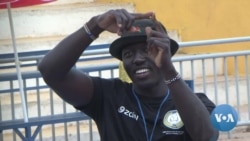Wheelchair basketball is growing in popularity in South Sudan, offering hope for athletes with disabilities, some of whom lost legs from unexploded ordnance left from decades of conflict.
U.S. professional wheelchair basketball players, including Sudanese American Malat Wei, this month helped 80 South Sudanese players take part in a week-long training program and tournament.
Wei is a wheelchair athlete who lost the use of his legs to polio in South Sudan when he was only three years old.
When Wei was 12, after living in a refugee camp for several years, his family moved to the United States, where he eventually played wheelchair basketball at the University of Arizona.
In December, he returned to South Sudan as a role model for other disabled athletes.
"I went through the same situation that these athletes are going through. So as for me coming back, it's a hope for them saying there is someone who actually cares about us,” Wei said.
This month,Wei helped train 80 South Sudanese wheelchair basketball players for a two-day competition in Juba.
The training was organized by the International Committee of the Red Cross (ICRC) and the South Sudan Wheelchair Basketball Association.
Wei says that in two years, the number of players has more than doubled, and this year, 15 women were included for the first time.
Anna Doki Gabriel, who had never played basketball before, talked about the goal of this training and competition.
Gabriel says, "For me as a person in a wheelchair, basketball has really made me feel that we can do something just like able-bodied people."
Conflict and poverty in South Sudan have marginalized more than 1.2 million people with disabilities, including some who lost legs from unexploded ordnance remaining after decades of conflict.
Disability and inclusion adviser for the ICRC, Jess Markt, has trained wheelchair teams in Afghanistan, the Middle East, and South America. He says the training works to change negative perceptions of people with disabilities.
"Once they start to have that confidence in themselves and they start to realize that maybe what they've always been told about what their place in society should be is not what their place in society should be, that they should expect more from themselves and from the society around them,” Markt said.
Wei says inclusion and acceptance isn't all these athletes learn, “These athletes are all from different tribes. But when they come to the basketball court the sport just brings this joy of all the South Sudanese uniting together to collaborate and work together as one country."









